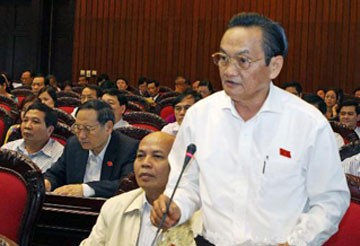(VOVworld) - The National Assembly’s 4th session on Tuesday discussed the implementation of this year’s socio-economic development plan and the plan for next year. This important session is being broadcast live on radio and television to voters nationwide.
 |
| Tran Du Lich, NA deputy from Ho Chi Minh City (Photo: hanoimoi.com.vn) |
The deputies agree that the government’s macro-economic management has been on the right track, achieving 10 of 15 targets. Major socio-economic developments since the beginning of this year include stabilizing the macro-economy, ensuring social security, doubling the foreign currency reserve, and reining in inflation. This year’s inflation estimate is around 8%. The law-makers say the socio-economic situation this year and next remain difficult, requiring a great effort by the political system and society to attain the targets set for next year. Tran Du Lich, a deputy from Ho Chi Minh city, says ‘The Government has thoroughly considered the major targets for next year’s socio-economic development. For example, this year’s GDP growth rate is estimated at 5.2% and it’s feasible to obtain next year’s GDP of 5.5% if we adopt stronger measures to revive the economy. Economists say Vietnam has greater demand than supply, which means the potential for growth is high and we haven’t fully exploited our previous investment. The question is not how much we should invest now to obtain a higher growth rate but how to exploit the current investment more effectively’.
Some deputies urged continued efforts to curb inflation, stabilize the macro-economy, resolve bad debts, and broadly restructure the macro-economy by forming a National Committee for Economic Restructuring headed by the Prime Minister. Le Huu Duc, a deputy from Khanh Hoa province, says ‘I agree with the Finance Ministry that credit organizations and banks are responsible for resolving bad debts. But to attack the root of the problem, I support the Government’s plan to form a national company to buy bad debts. We should boost consumption to reduce inventories. We should issue construction bonds for major national projects with priority for the transport sector, so we can sell stockpiled materials like steel and cement. Companies must strive to find outlets, reduce costs, and offer good after-sale services’.
The deputies urged the government to direct ministries, sectors, and enterprises to boost trade promotion and send trade representatives abroad to promote Vietnam’s spearhead products - rice, coffee, seafood, rubber, garments, and footwear. In order to maintain the social security index, deputies asked the government to manage social programs and policies to generate more jobs, raise incomes, and reduce poverty. Ministers, sectors, and localities should accelerate administrative reform, combat corruption, and practice thrift.
Later the same day, several cabinet mebers answered questions that concern NA deputies and voters nationwide. Minister of Health Nguyen Thi Kim Tien talked about people’s healthcare ‘People’s healthcare insurance is always an aspiration and a challenge for developing countries. Vietnam takes the lead with the World Bank and international organizations to ensure that by 2020, at least 80% of the population will have medical insurance. Currently, 68% of Vietnamese people have been provided with insurance with first priority given to the poor, ethnic minority groups, children under 6, policy beneficiaries, and the lower middle classes.’